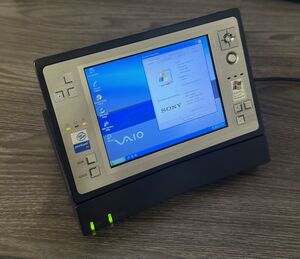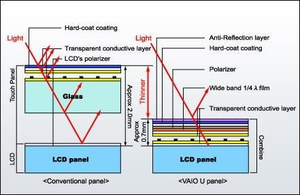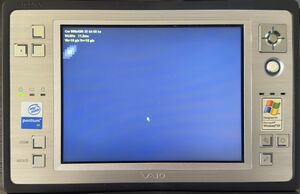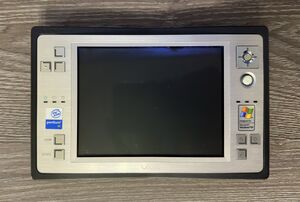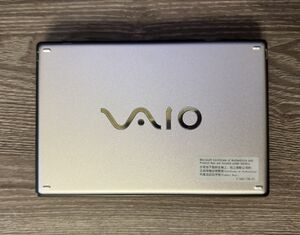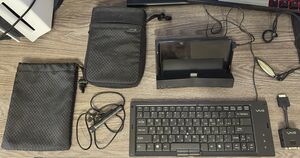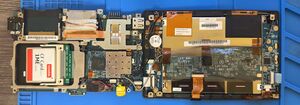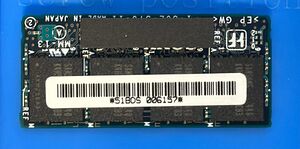VGN-U: Difference between revisions
Resident007 (talk | contribs) (→VGN-U50: fix pics) |
Resident007 (talk | contribs) (added a pic of 256mb memory module) |
||
| (15 intermediate revisions by the same user not shown) | |||
| Line 1: | Line 1: | ||
==Overview== | ==Overview== | ||
[[File:VGN-U-Promo.png|thumb| | [[File:VGN-U-Promo.png|thumb|434x434px|VGN-U Promotional Image[[File:VGN-U750P docked.jpg|thumb|VGN-U750P docked and running original Windows XP installation]]]] | ||
The Sony VAIO VGN-U was a line of subnotebooks sold by Sony from May 2004 to February 2005. At their release, they were the smallest independent computers running Windows XP and the most powerful high-end subnotebooks at the time, being roughly the size of two DVD cases stacked on top of each other. | [[File:VGN-U Display-design.png|thumb|VGN-U custom display panel design allows for a thin resistive touch screen that, however, almost does not bend when pressed with a stylus]] | ||
The Sony VAIO VGN-U was a line of subnotebooks sold by Sony from May 2004 to February 2005, which succeeded the [[PCG-U]] line and was the first "U" to be released outside Japan. At their release, they were the smallest independent computers running Windows XP and the most powerful high-end subnotebooks at the time, being roughly the size of two DVD cases stacked on top of each other. | |||
The first models of the series to come out were the VGN-U50 and the VGN-U70P in Japan. The American model, the VGN-U750P, came out in December 2004. A two models for Asian markets were introduced as well, specifically the VGN-U8C for Chinese market and the VGN-U8G for Singapore. | The first models of the series to come out were the VGN-U50 and the VGN-U70P in Japan. The American model, the VGN-U750P, came out in December 2004. A two models for Asian markets were introduced as well, specifically the VGN-U8C for Chinese market and the VGN-U8G for Singapore. | ||
The VGN-U lineup is also known as one of the only three Sony VAIO computers that had a transflective display (the other ones are the [[PCG-C2GPS]] but it had a separate backlight module making it more of a reflective display whereas backlight is built into the VGN-U display and PCG-U101, which has a truly transflective panel). | |||
==Detailed Specs== | ==Detailed Specs== | ||
The VGN-U lineup had a total of 6 models, some of which either had minor differences or were rebranded versions of previous models for other markets. | The VGN-U lineup had a total of 6 models, some of which either had minor differences or were rebranded versions of previous models for other markets.[[File:U750P-85Hz.jpg|thumb|VGN-U750P demonstrating 85Hz of actual display refresh rate in TFTTEST utility]]The custom proprietary display of VGN-U is seemingly capable of refresh rates up to 85Hz; although the integrated GPU outputs 60Hz signal, the display panel likely uses a technology called [[wikipedia:Motion_interpolation|motion interpolation]] to generate and insert frames between the real frames on the fly, thus smoothing any motion that happens on the screen. This theory is accompanied by direct comparison with the [[VGN-UX]], in which screen on the VGN-U seems more smooth in operation. | ||
None of the VGN-U models had a built-in keyboard. Instead, they had a separate Sony VGP-KBC1 Foldable Keyboard, the compact USB keyboard which resembles a laptop keyboard. It folds in the middle, and has a TrackStik mouse pointer in the center. When folded, the unit is approximately the same width and height of the U-series unit, and about half the thickness. | None of the VGN-U models had a built-in keyboard. Instead, they had a separate Sony VGP-KBC1 Foldable Keyboard, the compact USB keyboard which resembles a laptop keyboard. It folds in the middle, and has a TrackStik mouse pointer in the center. When folded, the unit is approximately the same width and height of the U-series unit, and about half the thickness. Also, all models had backlit buttons on the unit itself, which could show various light effects when device is turned on, attempted to turn on while on hold or the screen is rotated using Rotate button. | ||
Using a combination of bundled VGP-PRU1 Port Replicator, any USB keyboard and mouse connected to the Port Replicator (or just bundled VGP-KBC1 keyboard since it already has TrackStik), and any VGA monitor, user could essentially turn their VGN-U into a desktop PC while still retaining the portability: the unit can either divert display output to the VGA port or mirror the image, allowing for a convenient experience on a large screen, and can be undocked without turning the power off. Also, the Port Replicator will also charge the device's battery while it's docked. | |||
It came with many accessories in the box, including the Port Replicator, Remote Commander (headphone remote control unit, which is the same type used by Sony in its MiniDisc players, making it quite easy to find, which allows one to control audio playback and read current track information), VGA/Ethernet dongle, stylus and pouches for the computer and the foldable keyboard. | It came with many accessories in the box, including the Port Replicator, Remote Commander (headphone remote control unit, which is the same type used by Sony in its MiniDisc players, making it quite easy to find, which allows one to control audio playback and read current track information), VGA/Ethernet dongle, stylus and pouches for the computer and the foldable keyboard. | ||
| Line 28: | Line 27: | ||
'''Memory:''' 256MB DDR 266MHz (upgradable to 512MB using a proprietary memory module) | '''Memory:''' 256MB DDR 266MHz (upgradable to 512MB using a proprietary memory module) | ||
'''Display:''' 5" 800×600 custom transflective panel | '''Display:''' 5" 800×600 custom transflective LCD panel [[File:VGN-U750P Back.jpg|thumb|VGN-U750P, back view]][[File:VGN-U Accessories.jpg|thumb|VGN-U Accessories: VGP-PRU1 Port Replicator, VGP-KBC1 Foldable Keyboard, VGA/Ethernet dongle, Remote Commander, stylus and pouches for the computer itself and the keyboard[[File:Insides of the VGN-U.jpg|thumb|Insides of a flash-modded VGN-U]]]]'''Storage:''' 20 GB 1.8-inch IDE HDD | ||
''' | '''Weight:''' 550g | ||
''' | '''Original OS:''' Microsoft Windows XP Home Edition Service Pack 1 | ||
'''MSRP:''' ¥179,000 ($1595) | '''MSRP:''' ¥179,000 ($1595) | ||
=== '''VGN-U70P''' === | === '''VGN-U70P''' === | ||
'''Processor:''' Intel Pentium M 1GHz | |||
'''Graphics:''' Intel 855GM | '''Graphics:''' Intel 855GM | ||
| Line 45: | Line 43: | ||
'''Memory:''' 512MB DDR 266MHz | '''Memory:''' 512MB DDR 266MHz | ||
'''Display:''' 5" 800×600 custom transflective panel | '''Display:''' 5" 800×600 custom transflective LCD panel | ||
'''Storage:''' 20 GB 1.8-inch IDE HDD | '''Storage:''' 20 GB 1.8-inch IDE HDD | ||
| Line 51: | Line 49: | ||
'''Weight:''' 550g | '''Weight:''' 550g | ||
'''MSRP:''' ¥210,000 ($1871) | '''Original OS:''' Microsoft Windows XP Professional Service Pack 1 | ||
'''MSRP:''' ¥210,000 ($1871) | |||
=== '''VGN-U8G''' === | === '''VGN-U8G''' === | ||
'''Processor:''' Intel Celeron M 900MHz | '''Processor:''' Intel Celeron M 900MHz | ||
| Line 59: | Line 59: | ||
'''Chipset:''' Intel 855GM | '''Chipset:''' Intel 855GM | ||
'''Memory:''' 256MB DDR 266MHz (upgradable to 512MB using a proprietary memory module) | '''Memory:''' 256MB DDR 266MHz (upgradable to 512MB using a proprietary memory module) [[File:VGN-U Memory.jpg|thumb|512MB Memory Module for VGN-U line]]'''Display:''' 5" 800×600 custom transflective LCD panel | ||
'''Display:''' 5" 800×600 custom transflective panel | |||
'''Storage:''' 20 GB 1.8-inch IDE HDD | '''Storage:''' 20 GB 1.8-inch IDE HDD | ||
| Line 67: | Line 65: | ||
'''Weight:''' 550g | '''Weight:''' 550g | ||
'''MSRP:''' Unknown[[File:VGN- | '''Original OS:''' Microsoft Windows XP Home Edition Service Pack 1 | ||
'''MSRP:''' Unknown | |||
[[File:VGN-U 256MB module.png|thumb|256MB Memory Module for VGN-U line]] | |||
=== '''VGN-U8C''' === | === '''VGN-U8C''' === | ||
'''Processor:''' Intel Celeron M 900MHz | '''Processor:''' Intel Celeron M 900MHz | ||
| Line 77: | Line 79: | ||
'''Memory:''' 256MB DDR 266MHz (upgradable to 512MB using a proprietary memory module) | '''Memory:''' 256MB DDR 266MHz (upgradable to 512MB using a proprietary memory module) | ||
'''Display:''' 5" 800×600 custom transflective panel | '''Display:''' 5" 800×600 custom transflective LCD panel | ||
'''Storage:''' 20 GB 1.8-inch IDE HDD | '''Storage:''' 20 GB 1.8-inch IDE HDD | ||
| Line 83: | Line 85: | ||
'''Weight:''' 550g | '''Weight:''' 550g | ||
'''MSRP:''' Unknown | '''Original OS:''' Microsoft Windows XP Home Edition Service Pack 1 | ||
'''MSRP:''' Unknown | |||
=== '''VGN-U750P''' === | === '''VGN-U750P''' === | ||
'''Processor:''' Intel Pentium M 733 1.1GHz | '''Processor:''' Intel Pentium M 733 1.1GHz | ||
| Line 93: | Line 97: | ||
'''Memory: 512'''MB DDR 266MHz | '''Memory: 512'''MB DDR 266MHz | ||
'''Display:''' 5" 800×600 custom transflective panel | '''Display:''' 5" 800×600 custom transflective LCD panel | ||
'''Storage:''' 20 GB 1.8-inch IDE HDD | '''Storage:''' 20 GB 1.8-inch IDE HDD | ||
| Line 99: | Line 103: | ||
'''Weight:''' 550g | '''Weight:''' 550g | ||
'''MSRP:''' $1,799 (as of | '''Original OS:''' Microsoft Windows XP Professional Service Pack 2 | ||
'''MSRP:''' $1,799 (as of December 2004) | |||
=== '''VGN-U71P''' === | === '''VGN-U71P''' === | ||
'''Processor:''' Intel Pentium M 733 1.1GHz | '''Processor:''' Intel Pentium M 733 1.1GHz | ||
| Line 109: | Line 115: | ||
'''Memory:''' 512MB DDR 266MHz | '''Memory:''' 512MB DDR 266MHz | ||
'''Display:''' 5" 800×600 custom transflective panel | '''Display:''' 5" 800×600 custom transflective LCD panel | ||
'''Storage:''' 30 GB 1.8-inch IDE HDD | '''Storage:''' 30 GB 1.8-inch IDE HDD | ||
'''Weight:''' 550g | '''Weight:''' 550g | ||
'''Original OS:''' Microsoft Windows XP Professional Service Pack 2 | |||
'''MSRP:''' ¥199,800 ($1893) | '''MSRP:''' ¥199,800 ($1893) | ||
| Line 119: | Line 127: | ||
==Daily Usage Today== | ==Daily Usage Today== | ||
While extremely advanced for its size, especially back in 2004, all VGN-U models are almost completely useless from a practical point of use nowadays. Its processor has only one slow (by today's standards) core, 512MB of RAM is too little for modern tasks, and integrated graphics can't handle Windows Aero nor they have any WDDM drivers available. The 1.8" HDD is also quite slow (it uses the same compact IDE interface as Apple's iPods, so spares are easy and cheap to find, as well as flash modding solutions, however even if you manage to install a fast drive, you | While extremely advanced for its size, especially back in 2004 (being the smallest full-featured PC running Windows XP in the world when it was released), all VGN-U models are almost completely useless from a practical point of use nowadays. Its processor has only one slow (by today's standards) core, 512MB of RAM is too little for modern tasks, and integrated graphics can't handle Windows Aero nor they have any WDDM drivers available. The 1.8" HDD is also quite slow (it uses the same compact IDE interface as Apple's iPods, so spares are easy and cheap to find, as well as flash modding solutions, however even if you manage to install a fast drive, you will only see an increase in random access speeds, while linear speeds will still be limited by low bus speed). The lack of built-in keyboard makes it hard for office use as well. However, you still can do very basic web browsing, but it is not going to be a very pleasant experience. | ||
Overall, the VGN-U can only be recommended as a rare collectors item, and a rather expensive one as well, especially the VGN-U8C, VGN-U8G and VGN-U750P. | Overall, the VGN-U can only be recommended as a rare collectors item, and a rather expensive one as well, especially the VGN-U8C, VGN-U8G and VGN-U750P. | ||
==Resources== | ==Resources== | ||
[ | ===== Recovery Discs ===== | ||
{| class="wikitable" | |||
|VGN-U50 (DVD) | |||
|[https://archive.org/details/SonyVaioU50 Internet Archive] | |||
|- | |||
|VGN-U70P (CDs) | |||
|[https://archive.org/details/sony-vaio-u-70-p-cd-1 Internet Archive] | |||
|- | |||
|VGN-U70P (DVDs) | |||
|[https://archive.org/details/sony-vaio-u-70-p-dvd Internet Archive] | |||
|- | |||
|VGN-U71P (CDs) | |||
|[https://archive.org/details/vaio-u-71u-j-system-recovery-windowsxp-sp-2-cd-1-of-3 Internet Archive] | |||
|- | |||
|VGN-U71P (DVD) | |||
|[https://archive.org/details/vaio-u71u-j-system-recovery-windowsxp-sp2-dvd Internet Archive] | |||
|- | |||
|VGN-U750P (boot CD&DVD) | |||
|[https://archive.org/details/sonyvaiou750p Internet Archive] | |||
|- | |||
|VGN-U750P (CDs) | |||
|[https://archive.org/details/vaio-u750p-rec-cd Internet Archive] | |||
|} | |||
== | ===== Hard drive images ===== | ||
[https://archive.org/details/ | {| class="wikitable" | ||
|VGN-U8G | |||
|[https://archive.org/details/vaio-u8g-dump Internet Archive] | |||
|} | |||
===== Recovery partition images ===== | |||
{| class="wikitable" | |||
|VGN-U750P | |||
|[https://archive.org/details/vaio-u750p-recovery-partition-image Internet Archive] | |||
|- | |||
|VGN-U71P | |||
[https://archive.org/details/vaio-u750p-recovery-partition-image VGN- | |[https://archive.org/details/vaio71p-recovery-partition Internet Archive] | ||
|} | |||
[https://archive.org/details/ | [https://youtu.be/ESbdA2bDGwk?si=Kwc-UIb39jorLwDU&t=214 Sony VAIO VGN-U Disassembly Guide] | ||
[https:// | |||
[ | [http://www.vaio.sony.co.jp/Products/VGN-U50/ Sony VAIO Type U Presentation Page] | ||
==Sources== | ==Sources== | ||
[https://sony.com Sony] and [[wikipedia:Sony_Vaio_U_series|Wikipedia]] | [https://sony.com Sony] and [[wikipedia:Sony_Vaio_U_series|Wikipedia]] | ||
Latest revision as of 18:25, 17 December 2024
Overview
The Sony VAIO VGN-U was a line of subnotebooks sold by Sony from May 2004 to February 2005, which succeeded the PCG-U line and was the first "U" to be released outside Japan. At their release, they were the smallest independent computers running Windows XP and the most powerful high-end subnotebooks at the time, being roughly the size of two DVD cases stacked on top of each other.
The first models of the series to come out were the VGN-U50 and the VGN-U70P in Japan. The American model, the VGN-U750P, came out in December 2004. A two models for Asian markets were introduced as well, specifically the VGN-U8C for Chinese market and the VGN-U8G for Singapore.
The VGN-U lineup is also known as one of the only three Sony VAIO computers that had a transflective display (the other ones are the PCG-C2GPS but it had a separate backlight module making it more of a reflective display whereas backlight is built into the VGN-U display and PCG-U101, which has a truly transflective panel).
Detailed Specs
The VGN-U lineup had a total of 6 models, some of which either had minor differences or were rebranded versions of previous models for other markets.
The custom proprietary display of VGN-U is seemingly capable of refresh rates up to 85Hz; although the integrated GPU outputs 60Hz signal, the display panel likely uses a technology called motion interpolation to generate and insert frames between the real frames on the fly, thus smoothing any motion that happens on the screen. This theory is accompanied by direct comparison with the VGN-UX, in which screen on the VGN-U seems more smooth in operation.
None of the VGN-U models had a built-in keyboard. Instead, they had a separate Sony VGP-KBC1 Foldable Keyboard, the compact USB keyboard which resembles a laptop keyboard. It folds in the middle, and has a TrackStik mouse pointer in the center. When folded, the unit is approximately the same width and height of the U-series unit, and about half the thickness. Also, all models had backlit buttons on the unit itself, which could show various light effects when device is turned on, attempted to turn on while on hold or the screen is rotated using Rotate button.
Using a combination of bundled VGP-PRU1 Port Replicator, any USB keyboard and mouse connected to the Port Replicator (or just bundled VGP-KBC1 keyboard since it already has TrackStik), and any VGA monitor, user could essentially turn their VGN-U into a desktop PC while still retaining the portability: the unit can either divert display output to the VGA port or mirror the image, allowing for a convenient experience on a large screen, and can be undocked without turning the power off. Also, the Port Replicator will also charge the device's battery while it's docked.
It came with many accessories in the box, including the Port Replicator, Remote Commander (headphone remote control unit, which is the same type used by Sony in its MiniDisc players, making it quite easy to find, which allows one to control audio playback and read current track information), VGA/Ethernet dongle, stylus and pouches for the computer and the foldable keyboard.
VGN-U50
Processor: Intel Celeron M 900MHz
Graphics: Intel 855GM
Chipset: Intel 855GM
Memory: 256MB DDR 266MHz (upgradable to 512MB using a proprietary memory module)
Display: 5" 800×600 custom transflective LCD panel
Storage: 20 GB 1.8-inch IDE HDD
Weight: 550g
Original OS: Microsoft Windows XP Home Edition Service Pack 1
MSRP: ¥179,000 ($1595)
VGN-U70P
Processor: Intel Pentium M 1GHz
Graphics: Intel 855GM
Chipset: Intel 855GM
Memory: 512MB DDR 266MHz
Display: 5" 800×600 custom transflective LCD panel
Storage: 20 GB 1.8-inch IDE HDD
Weight: 550g
Original OS: Microsoft Windows XP Professional Service Pack 1
MSRP: ¥210,000 ($1871)
VGN-U8G
Processor: Intel Celeron M 900MHz
Graphics: Intel 855GM
Chipset: Intel 855GM
Memory: 256MB DDR 266MHz (upgradable to 512MB using a proprietary memory module)
Display: 5" 800×600 custom transflective LCD panel
Storage: 20 GB 1.8-inch IDE HDD
Weight: 550g
Original OS: Microsoft Windows XP Home Edition Service Pack 1
MSRP: Unknown
VGN-U8C
Processor: Intel Celeron M 900MHz
Graphics: Intel 855GM
Chipset: Intel 855GM
Memory: 256MB DDR 266MHz (upgradable to 512MB using a proprietary memory module)
Display: 5" 800×600 custom transflective LCD panel
Storage: 20 GB 1.8-inch IDE HDD
Weight: 550g
Original OS: Microsoft Windows XP Home Edition Service Pack 1
MSRP: Unknown
VGN-U750P
Processor: Intel Pentium M 733 1.1GHz
Graphics: Intel 855GM
Chipset: Intel 855GM
Memory: 512MB DDR 266MHz
Display: 5" 800×600 custom transflective LCD panel
Storage: 20 GB 1.8-inch IDE HDD
Weight: 550g
Original OS: Microsoft Windows XP Professional Service Pack 2
MSRP: $1,799 (as of December 2004)
VGN-U71P
Processor: Intel Pentium M 733 1.1GHz
Graphics: Intel 855GM
Chipset: Intel 855GM
Memory: 512MB DDR 266MHz
Display: 5" 800×600 custom transflective LCD panel
Storage: 30 GB 1.8-inch IDE HDD
Weight: 550g
Original OS: Microsoft Windows XP Professional Service Pack 2
MSRP: ¥199,800 ($1893)
Daily Usage Today
While extremely advanced for its size, especially back in 2004 (being the smallest full-featured PC running Windows XP in the world when it was released), all VGN-U models are almost completely useless from a practical point of use nowadays. Its processor has only one slow (by today's standards) core, 512MB of RAM is too little for modern tasks, and integrated graphics can't handle Windows Aero nor they have any WDDM drivers available. The 1.8" HDD is also quite slow (it uses the same compact IDE interface as Apple's iPods, so spares are easy and cheap to find, as well as flash modding solutions, however even if you manage to install a fast drive, you will only see an increase in random access speeds, while linear speeds will still be limited by low bus speed). The lack of built-in keyboard makes it hard for office use as well. However, you still can do very basic web browsing, but it is not going to be a very pleasant experience.
Overall, the VGN-U can only be recommended as a rare collectors item, and a rather expensive one as well, especially the VGN-U8C, VGN-U8G and VGN-U750P.
Resources
Recovery Discs
| VGN-U50 (DVD) | Internet Archive |
| VGN-U70P (CDs) | Internet Archive |
| VGN-U70P (DVDs) | Internet Archive |
| VGN-U71P (CDs) | Internet Archive |
| VGN-U71P (DVD) | Internet Archive |
| VGN-U750P (boot CD&DVD) | Internet Archive |
| VGN-U750P (CDs) | Internet Archive |
Hard drive images
| VGN-U8G | Internet Archive |
Recovery partition images
| VGN-U750P | Internet Archive |
| VGN-U71P | Internet Archive |

